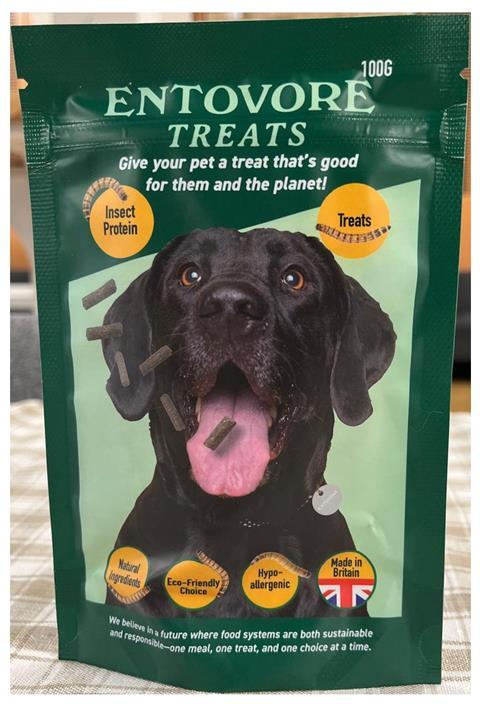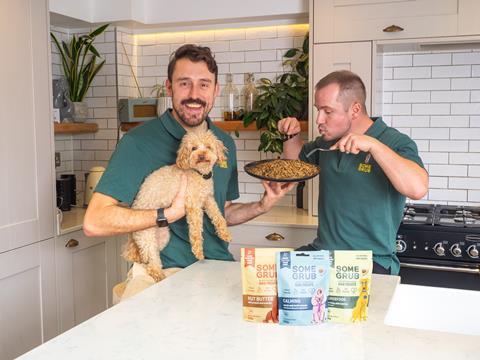Insects have nearly made it on menus for a good while now. But progress has been stymied by regulatory hurdles, conspiracy theories and the ‘yuck factor’. Can the idea still make progress?
Early last year, a much-hyped new restaurant opened its doors in Finsbury Park, north London, replete with the industrial aesthetic, small plates and ambitious young founders that are the hallmark of many London hotspots.
But diners queueing up for Yum Bug on a Friday night were after a culinary experience with a six-legged twist.
Steaming dishes of crickets whole-roasted in bombay mix, minced in roasted vegetable salads and even powdered in caramel baklava flew out of the kitchen, all in a bid by 30-year-old founders Leo Taylor and Aaron Thomas to show that “edible insects can help create a healthier and more sustainable food system”.
But a little over a year later, despite injections of cash from BrewDog co-founder James Watt and interest from major restaurant chains, Yum Bug quietly closed, Taylor writing on LinkedIn that “despite strong early momentum, the business couldn’t deliver the returns needed to be sustainable”.
Sadly, it was an all-too familiar trajectory.
For all the buzz around insects as a novel and sustainable alternative to traditional proteins, bug-based brands and producers have hit repeated roadblocks. In 2021, UK-based insect pioneer AgriProtein halted operations; French mealworm manufacturer Ynsect came close to collapse earlier this year; and even celeb-backed ventures, like Bear Grylls’ protein bars stuffed with buffalo mealworms, are now absent from mainstream stockists eight years after launch.
So, why has the media buzz over edible insects struggled to translate onto our shelves? And is there hope for a metamorphosis?
Hype to regulatory headache
Though tucking into fried crickets, locusts and larvae at street markets, or ground into powders and stirred through soups and stews, has been a mainstay of diets in many African, Asian and Latin American countries for millennia, the west has been slower to catch on.
That began to change 10 years ago when a high-profile report by the UN flagged insect protein as a key solution for global food insecurity and sustainability.
Requiring significantly less space and water than conventional livestock, with a faster growth rate, a higher feed-to-food conversion efficiency and emitting less carbon and ammonia, insects are also nutrient-dense, it was argued. Though it varies between species, protein content per insect can hit as high as 60%, roughly twice that of beef and three times of chicken.
Buoyed by the UN’s backing and convinced customers would (soon) buy into the proposition, a slew of insect-based startups emerged in Europe, from snack bars to protein powders to cricket-infused flours, all regulated under the EU’s novel foods framework.
“With automation improving the precision and scalability of insect farms, the sector is gaining serious momentum”
But then came Brexit, and with it a legal grey area that stopped the growth of edible insects in its tracks as the FSA grappled with the weight of its new responsibilities to enforce novel foods regulations. “Suddenly, the FSA had to figure out what this regulation is, hire hundreds of people and get a handle on it,” says Geoff Knott, co-founder of both sports nutrition insect-brand Hop and Edibl, a startup that grows insects via vertical farming. The lack of clarity that followed “really hurt the whole industry,” he admits, causing “a lot of uncertainty and risk”. Innovation, inevitably, slowed.
Three years later, after insect companies rallied together to compile new dossiers and negotiate with the FSA, a transitional agreement was reached that allowed products containing insect species with an application submitted prior to 31 December 2023 – yellow mealworm, house cricket, banded cricket and black soldier fly met these conditions – to remain legally on shelves pending a full assessment.

But with little movement since, the glacial progress in regulation around edible insects has caused untold damage, believes Tiziana Di Costanzo, founder of edible insect farm Horizon Foods. “I call it regulatory sabotage because nothing has really changed,” she says. “The FSA is stalling the industry by not progressing with the approvals, which have been sitting with them since 2021. Yes, it’s authorised, but it’s a provisional measure. So how do you develop a product, an industry, a business based on such a big question mark?”
Knott says conversations with regulators have given him hope. “I’m cautiously optimistic the UK will have a competitive advantage on the regulatory side in the future because they’re actively looking at reforming the bureaucratic process, while for my counterparts in the EU, I can only see it becoming more cumbersome.”
Even with a more streamlined approvals process though; edible insects are still up against it. The challenges faced by promising startups like Yum Bug points to an even bigger issue: lack of demand.
The concept of eating insects might interest consumers as a novel one-off, but as a weekly or daily replacement for meat? That’s much tougher. In fact, a 2022 survey of nearly 2,000 adults by the FSA found that just 25% said they would eat insects, 30% driven by the environmental benefits, while 67% remained resolutely against, saying that ‘nothing’ could tempt them.
“The idea that you’re going to get people to eat insects to a meaningful degree, much less eating them instead of meat, doesn’t look very promising to us,” says Dustin Crummett, executive director of the US-based Insect Institute, which co-authored a peer-reviewed study published in June that argued consumer disgust could be an insurmountable barrier.
Conspiracy theories
So incendiary is the topic for some, in fact, that it’s routinely weaponised by right-wing figures in the US, many of which argue a secret corporate cabal is infusing everyday foods with insects without consumers’ knowledge. The Grocer found no evidence of this.
“It’s very activating for people,” Crummett says, of the viral rumours that now circulate about insects. “People have such a strong disgust reaction” coupled with the fact that it’s promoted by large organisations like the UN and Gates Foundation “that people on the right are sometimes distrustful of anyway.”
It’s a waste of resources to try and change minds in many cases, he believes.
“If you’re thinking about trying to get people to eat less meat, then plant-based meats or cultivated meat look much more promising because they fit much more nicely into existing culinary practices,” he says. By pushing insects, “you’re trying to follow the path of most resistance.” Yes, you could “pour a bunch of resources into it and move [sentiment] slightly among a tiny portion of people, but is that a good use of limited political capital and resources?”
Some think it is.
For Knott, neophobia – the fear of trying something novel – is a barrier to lots of alternatives emerging in food and drink. “It’s not unique to insects. At a novel foods event, a couple of weeks ago, I met people in precision fermentation, in algae protein…all exciting [but] from a consumer point of view might make you wary.” With enough time, exposure and education, an aversion to eating insects could be tackled, particularly among young people, he believes, who haven’t yet learned to view them as, well, gross.
With progress still slow, though, much of the industry seems to have diverted its attentions to a different role for insects: animal feed and waste management.
At the forefront are the likes of Entocycle, which uses its London showroom to demonstrate its patented insect farming technology to prospective buyers. Launched in 2016, the company breeds insects like black soldier flies, fattening them up with food waste and then closing the virtuous loop by selling them as animal food, replacing the demand on environmentally questionable animal feed like soy and fishmeal.
One WWF report calculated total demand for insect meal from the UK’s pig, poultry and salmon sectors could reach 540,000 tonnes a year by 2050, around 240,000 tonnes of which could potentially be sourced from UK insect farms, if – and it’s a big if – the UK reviewed its current rules. Currently, processed animal protein (PAP) made from an authorised insect species and intended for aquaculture feed, animal feed and petfood is permitted, but not farmed livestock like pigs or poultry. With the EU having revised its position in 2021, though, the UK is expected to follow suit.

“Poultry and aquaculture production is set to grow significantly in the next 20 years, creating surging demand for the feeds that supply them,” explains Keith Thornhill, head of food and beverage for UK&I at Siemens, which has worked with Entocycle on scaling its tech. “Alternative proteins like insects are needed to meet this demand, and the drive for sustainability and food security amplifies this need further. With automation improving the precision and scalability of insect farms, the sector is gaining serious momentum.”
But even when it comes to insects as animal feed, there are doubters.
Crummett questions whether such a shift is more sustainable than what already exists. In some operations, food waste isn’t used, which means insects also need to be fed, adding another trophic layer to environmental impact, he flags, and “then there are the other resources involved. If you’re doing it in Europe with black soldier flies, which are the most commonly farmed, these are tropical insects. You need an expensive building that’s well insulated and you have to heat it the whole year, which uses a lot of energy.”
“There has been some negative pushback because of where farms are being set up, they can be quite energy-intensive and, depending on the climate of the country you’re setting up in, there’s an impact on how much energy you need to keep climate conditions right,” accepts Amanda Thomas, principal consultant for food loss, systems and waste at Anthesis. “But to my knowledge that does not outweigh the emerging body of evidence that insects have a lower environmental impact.”
“It’s also very expensive, which is why the big companies are having so much trouble,” insists Crummett. And certainly, the struggles of major insect farmers like Ynsect in France – which requested to enter into administration in February – and AgriProtein in the UK, do suggest that making insect farming commercially viable has plenty of hurdles to overcome.

Hope on the horizon
Ten years after the UN sent insect protein hurtling into headlines here in the west, its use as a scalable, sustainable alternative to traditional protein – whether for humans or animals – remains incredibly divisive.
But for those still pushing its potential, of which there remain plenty (see box, p36), it isn’t over yet.
“I think this is going to come with time,” says Knott. “Insects are still niche right now, but compared to 10 years ago, people are a lot more aware. Ten years ago, there was maybe one article every two or three months talking about the promise of edible insects…now there’s activity every day.
“The food system’s so complex, and there’s so much strain on it, that it’s not going to be a single company or a quick win. Everyone’s looking at this from a long-term perspective.”
Five insect companies still betting on insects

Edibl
The UK Insect Company: In September, UK cricket farm Edibl officially went live with its commercial-scale production of Acheta domesticus (house crickets to most of us). Based in Norfolk, the farm was co-founded by Geoff Knott (pictured), who also launched insect-based sports nutrition business Hop in 2018, and Daniel Levan-Harris, and uses vertical farming technologies to breed insects as a protein source for both humans and pets, utilising local energy and recycled food waste. Having just completed its latest funding round, the startup is still on the hunt for both investors and food businesses looking to explore insect protein.
Entovore Treats
Dorset-based Entovore takes British-farmed mealworms, fattened up with food waste, and turns them into hypoallergenic, grain-free food for dogs, made with only five ingredients. Not only is that a sustainable bonus for eco-conscious pet owners, say the founders, but it’s also ideal for dogs with sensitive stomachs. That’s because mealworms are rich in amino acids and healthy fats, and also apparently easier for dogs to digest.
The Insect Café
Not deterred by the challenges faced by the likes of Yum Bug, Scotland’s Insect Café buys specially reared insects from English farms and processes them into indulgent insect goodies in its commercial kitchen in Edinburgh. Set up by ecologist Nahla Mahmoud, its products include cakes made with cricket flour and cricket brownies that showcase how insects can be added to an array of everyday foods.
Some Grub
In May, insect-based petfood brand Some Grub successfully raised £270k to help expand its availability across the UK and “lead Britain’s insect food revolution”. Having launched in 2024 with three types of dog treats made from high-protein bugs and vegetables, it gained its first national listing at the end of last year, landing a spot on The Co-op’s incubator scheme. “Like us, our investors believe Some Grub will be a game-changing business for the petfood industry and has what it takes to become a major player in the category,” say co-founders Ollie Harkus and Ben Chapman.
Wriggle
Though its cricket-based burgers haven’t quite made it to market (yet), Wriggle has already managed to get its insect-based innovation on display at London’s Science Museum as part of the Future of Food exhibition and, the brand says on its website, availability to the rest of us is ‘coming soon’.
Green Week features are sponsored by EcoVend

























No comments yet